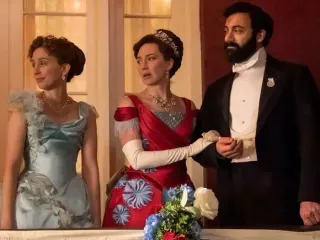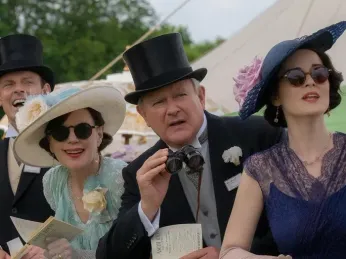
Sep 14
‘Downton Abbey: The Grand Finale’ – The concluding elegant hurrah of the British series and films
Brian Bromberger READ TIME: 1 MIN.
We can assure “Downton Abbey” fans that the final entry in the now 15-year-saga, through six seasons on PBS (its most watched drama ever), and now three feature films, that “The Grand Finale” (Focus Features) is a fitting farewell to the franchise, as good as it needs to be, especially considering the movie poster’s tagline: ‘The time has come to say goodbye.’ (sniffle, sniffle) Indeed!
Of course, one could also argue that this historical drama has been saying sayonara since 2015, with the conclusion of season six in the series, followed by the movies, “Downton Abbey (2019),” and “A New Era (2022).” It’s beginning to feel like Cher’s never-ending farewell tour.
But diehard viewers can take comfort in the palatial real estate (including a scene at the Ascot Race Course), titles, etiquette niceties, gowns (including a gorgeous red one for Lady Mary to cement her now scarlet woman image), dinner table elegance, and upper-class shenanigans to satisfy any aficionado of British period piece porn. It all borders on nostalgia for nostalgia’s sake.
Scandals in tandem
The timeline of the plot, which is almost incidental, is 1930. Lady Mary Crawley (Michelle Dockery) has quietly divorced her absentee husband, but the newspapers have discovered the scandalous news, making her a social pariah to the point she’s ejected from a London party by the hostess. It’s announced with the same gravity one might associate with a terrorist attack.
At the screening I attended, the audience started laughing when they discovered the reason why Lady Mary was asked to leave. But not so funny is the possibility that Downton Abbey might go into bankruptcy. After the death of Lady Cora’s (Elizabeth McGovern) mother, her American brother Harold (Paul Giamatti in hang-dog mode) mismanaged the estate’s finances after the Depression and there’s no money left, despite getting help from a questionable advisor Gus Sambrook (Alessandro Nivola) who lacks the requisite twirling moustache, but has bedroom eyes for Lady Mary.
Then there’s the question of whether Lord Grantham (Hugh Bonneville) will cede control of Downton to Lady Mary as the times are changing and she seems better able to manage the estate into its shaky uncertain modern future.
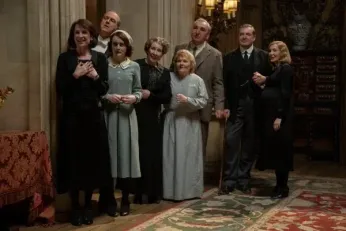
The help
Per the servants, butler Carson (Jim Carter, better known as Mr. Imelda Staunton) is finally retiring, allowing his young protégé Andy (Michael Fox) to take his position. Andy is married to Daisy (Sophie McShera) who’s ready to seize the kitchen reins from the retiring Mrs. Patmore (Lesley Nicol). Maid to Lady Mary Anna (Joanne Froggatt) and butler to Lord Grantham John Bates (Brendan Coyle) are expecting a child.
The buffoonish Molesley (Kevin Doyle), now a screenwriter, after “A New Era,” gets to utter creator Baron Julian Fellowes revenge stinger, “In my eyes, the writers are the real stars of cinema.” (and yes, they are). All the sprawling characters, who now seem like old friends, are given suitable swan song story arcs and closeup moments, generating closure for all concerned.
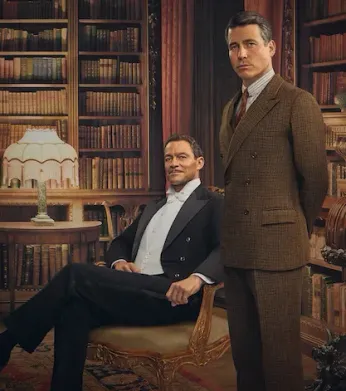
In absentia; gay guests
The one character absent is the very much missed matriarch Dowager Violet Crawley (the late great Maggie Smith) who was given a beautiful death in “A New Era” and is now reduced to an imperious portrait hanging over the fireplace, appropriately still looking down on everyone else. Her spit and vinegary, mordant bon mots are a real loss, as they provided some needed wit, to make sure we never took anything going on at Downton too seriously, including a humorous reference to her immortal insult, “What is a week end?” The film is dedicated to her memory.
Dominic West returns as the rakish actor Guy Dexter (having made a film at Downton in the “New Era” sequel) is starring in a London operetta by Noel Coward, bringing along former footman Barrows (Robert James-Collier), his organizer, dresser, and undressed, secret lover.
They will stay at Downton for a party to help restore Lady Mary’s social standing among the local nobility, bringing along their friend playwright/composer Noel Coward (Arty Froushan, fabulous and gay), who provides some welcome barbed cheeky wisdom and singing the satirical song, “Poor Little Rich Girl” as an ode to Lady Mary. Coward will use Mary’s divorce as the inspiration for his classic comedy, “Private Lives.”
We can see before our very eyes the era when celebrities eclipsed aristocracy. The other worthy addition is the magnificent Simon Russell Beale (who’s also gay) as Sir Hector Moreland, the snobbish pompous grumpy, local head of the planning commission for the annual county fair, who harrumphing any innovation suggested by Isobel Grey (Penelope Wilton), steals every scene in which he appears.
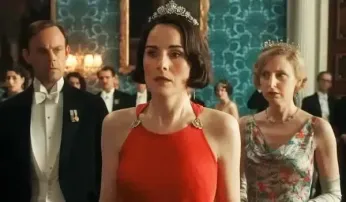
Of course, aside from the late Maggie Smith, the real star of Downton Abbey has been the country stately manor itself, played by Hampshire’s Highclere Castle, which 25 minutes into the film has its final sweeping full view in all its glory as the Crawley car travels along the winding highway.
Fifteen years later, its majestic beauty can still take one’s breath away. Characters may come and go, along with heartbreak or triumph, yet it’s the house itself that stands, as the ultimate survivor, despite any changes occurring in the family or the world for that matter.
It’s all escapist plodding piffle yet we can’t help watching. One can wonder why are we so immersed in the petty affairs of the wealthy landed gentry? A clue comes in a line uttered by Harold: “They say America is the future and England is the past. Sometimes it’s more comfortable in the past.”
The theme of the film is change, but it’s mostly superficial as the rigid class system and sexual/gender roles/inequalities remain firmly entrenched. Yet as conservative Tory Baron Fellowes remarked in an interview on the PBS Newshour, trying to explain Downton’s appeal, “It was a world of good order, manners, where people were pleasant to each other creating a sense of community and there was much less anger.”
Fictious glory
This is of course an idyllic fictious world that never existed in real life, especially the warm comradery between servants and masters. Still, the movie’s loveliest sequence occurs with Lord Grantham seeking advice from Carson about whether he should sell their London home, retire to a flat (“a sort of layer cake of strangers”), then hand Downton over to Lady Mary.
It never happened, but we so want to believe this enduring friendship truly thrived. There’s so much change happening in our world today, mostly negative, that in the course of two hours we can retreat to a kinder, gentler universe in which people of different classes were kinder to each other. Pleasantry now seems as archaic as chivalry in the Middle Ages.
Despite so much of it being sentimental claptrap, at the end one may have to fight back tears. The series used every soap opera cliché in the book for the plot narratives, yet Fellowes’s genius is creating characters we genuinely loved (a feat he’s not been able to replicate for the servants in “The Gilded Age,” of whose fate we remain indifferent) and cared about their petty plights, with brilliantly cast actors forming a perfect ensemble. You really get the sense the actors love each other and their characters, so they will genuinely miss each other (as well as their paychecks).
“The Grand Finale” is ultimately about letting go and moving on. The film claims this is the last installment of this dramatic conglomerate. But is it really over, especially if there’s box office magic? If we advance 10 years, then it would be World War II, with Lady Mary’s son, Georgie, the right age for serving in the military.
The sudsy possibilities are endless, since Baron Fellowes is only 76. Yet there is a sense of things winding down with its convoluted melding of tradition with modernity. It seems appropriate that this movie might indeed be the fond heartwarming sendoff it purports to be, content with not overstaying its welcome, to the sad sobbing resignation of its legions of devotees.
‘Downton Abbey: The Grand Finale’ screens in local theaters through Sept 28.
https://www.focusfeatures.com/downton-abbey-the-grand-finale

